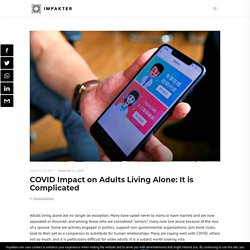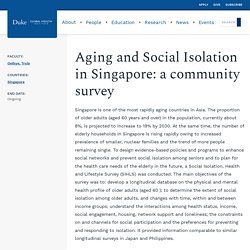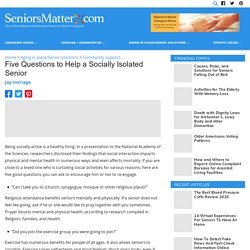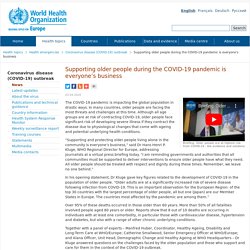

Social isolation and loneliness. Factors contributing to social isolation. The causes of today’s social isolation. Sexual Orientation increase in social isolation. COVID Impact on Adults Living Alone: It is Complicated - Impakter. Adults living alone are no longer an exception.

Many have opted never to marry or have married and are now separated or divorced; and among those who are considered “seniors”, many now live alone because of the loss of a spouse. Some are actively engaged in politics, support non-governmental organizations, join book clubs, look to their pet as a companion to substitute for human relationships. Many are coping well with COVID; others not so much, and it is particularly difficult for older adults. It is a subject worth looking into. The prevalence of one-person households is greater than ever in human history. For example, in Sweden, one-person households outnumber those with multiple occupants. Explanations for this plague of loneliness abound, ranging from declining participation in organized social activities and religious organizations to the ubiquity of technology such as social media and cell phones that offer non-physical contact and the loss of intimacy.
The U.S. Social isolation (Medical Symptom) Effects of Loneliness on Physical, Cognitive and Socio-Emotional Development in Elderly by Critical Care Nurse. Increased levels of dementia and loss of cognitive function in elderly. Physical health issues arising from social isolation. Social isolation and the elderly poor in Singapore.
SINGAPORE: Her one-room flat was a cluttered mess, and Madam Helen Fernandez herself never seemed to bathe, said her neighbours who always saw her in the same set of clothes. When case workers first visited the unkempt and confused elderly widow, they had to rush her to hospital for very high blood pressure – which resulted because she hadn’t been taking her medication and had been missing doctors’ appointments.
Since her husband died 17 years ago, Mdm Fernandez had been living alone with no friends or family – and slowly falling prey to loneliness and dementia. There were times when she’d even call up the police just to talk. It was how her case got referred to the Social Service Office, and then to case worker Ahmala Rajoo in 2015. “She was receiving financial assistance, about S$500 a month,” said Ms Ahmala, a care executive with NTUC Health Cluster Support in Bukit Merah. But the neatly-groomed Mdm Fernandez you meet today almost doesn’t seem the same person.
“Her memory has worsened. One in Three Seniors Is Lonely. Here's How It’s Hurting Their Health. Aging and Social Isolation in Singapore: a community survey. Singapore is one of the most rapidly aging countries in Asia.

The proportion of older adults (aged 60 years and over) in the population, currently about 8%, is projected to increase to 19% by 2030. At the same time, the number of elderly households in Singapore is rising rapidly owing to increased prevalence of smaller, nuclear families and the trend of more people remaining single. Five Questions to Help a Socially Isolated Senior - SeniorsMatter.com. Being socially active is a healthy thing.

In a presentation to the National Academy of the Sciences, researchers disclosed their findings that social interaction impacts physical and mental health in numerous ways and even affects mortality. If you are close to a loved one who is curtailing social activities for various reasons, here are five good questions you can ask to encourage him or her to re-engage. "Can I take you to (church, synagogue, mosque or other religious place)? " Religious attendance benefits seniors mentally and physically. If a senior does not feel like going, ask if he or she would like to pray together with you sometimes. "Did you join the exercise group you were going to join? " Exercise has numerous benefits for people of all ages. Understanding the Health Effects of Loneliness: Take the Quiz » Sonata Senior Living In Central & South Florida. 100 Great Questions to Ask Grandparents During COVID-19. During the time of the pandemic, seniors are one of the most vulnerable groups to loneliness and isolation.

Many seniors are either under stricter visitation guidelines, whether they are at home or in assisted living communities. While your loved ones are more physically distanced from others in their community and your family, it is more difficult for them to get the socialization they are used to. Not addressing this can easily have a negative impact on their mental, physical, and emotional health. Coronavirus disease (COVID-19) outbreak - Supporting older people during the COVID-19 pandemic is everyone’s business. The COVID-19 pandemic is impacting the global population in drastic ways.

In many countries, older people are facing the most threats and challenges at this time. Although all age groups are at risk of contracting COVID-19, older people face significant risk of developing severe illness if they contract the disease due to physiological changes that come with ageing and potential underlying health conditions. “Supporting and protecting older people living alone in the community is everyone’s business,” said Dr Hans Henri P. Kluge, WHO Regional Director for Europe, addressing journalists at a virtual press briefing today.